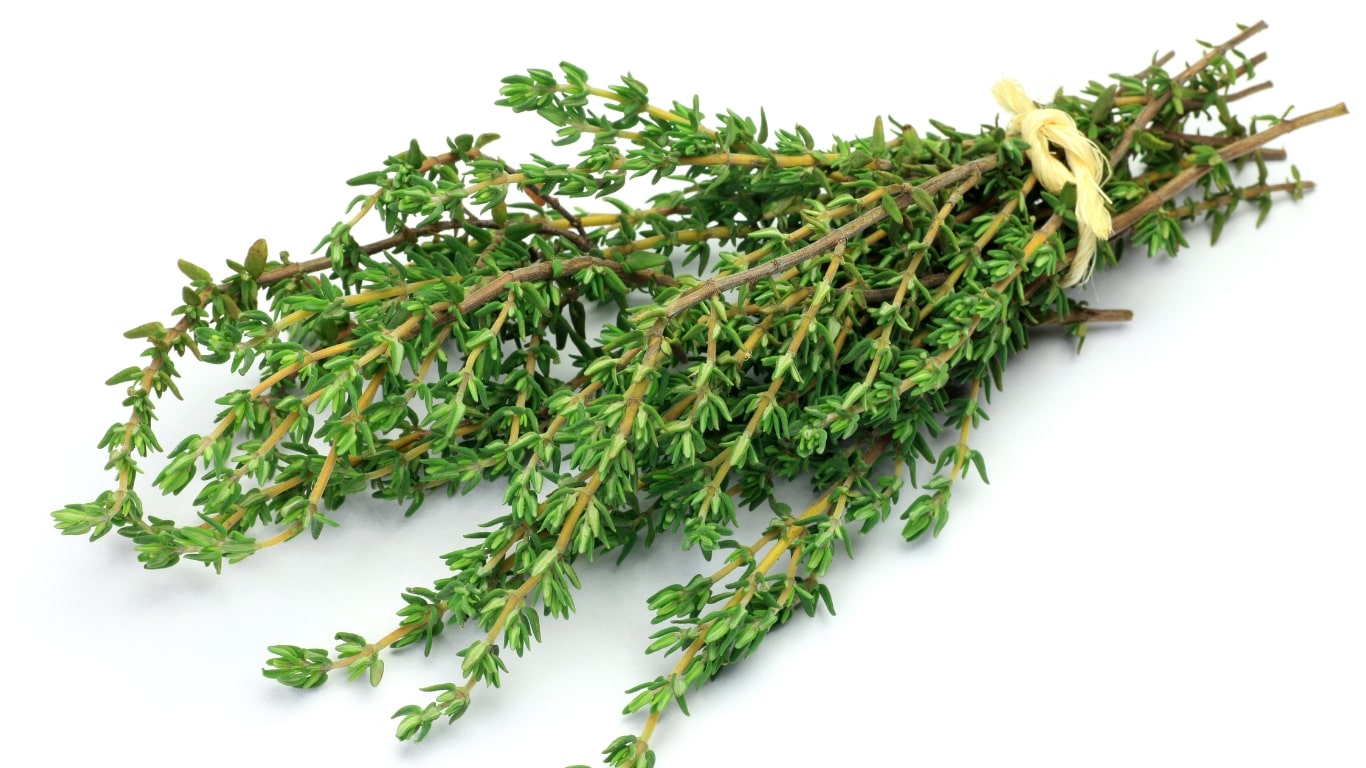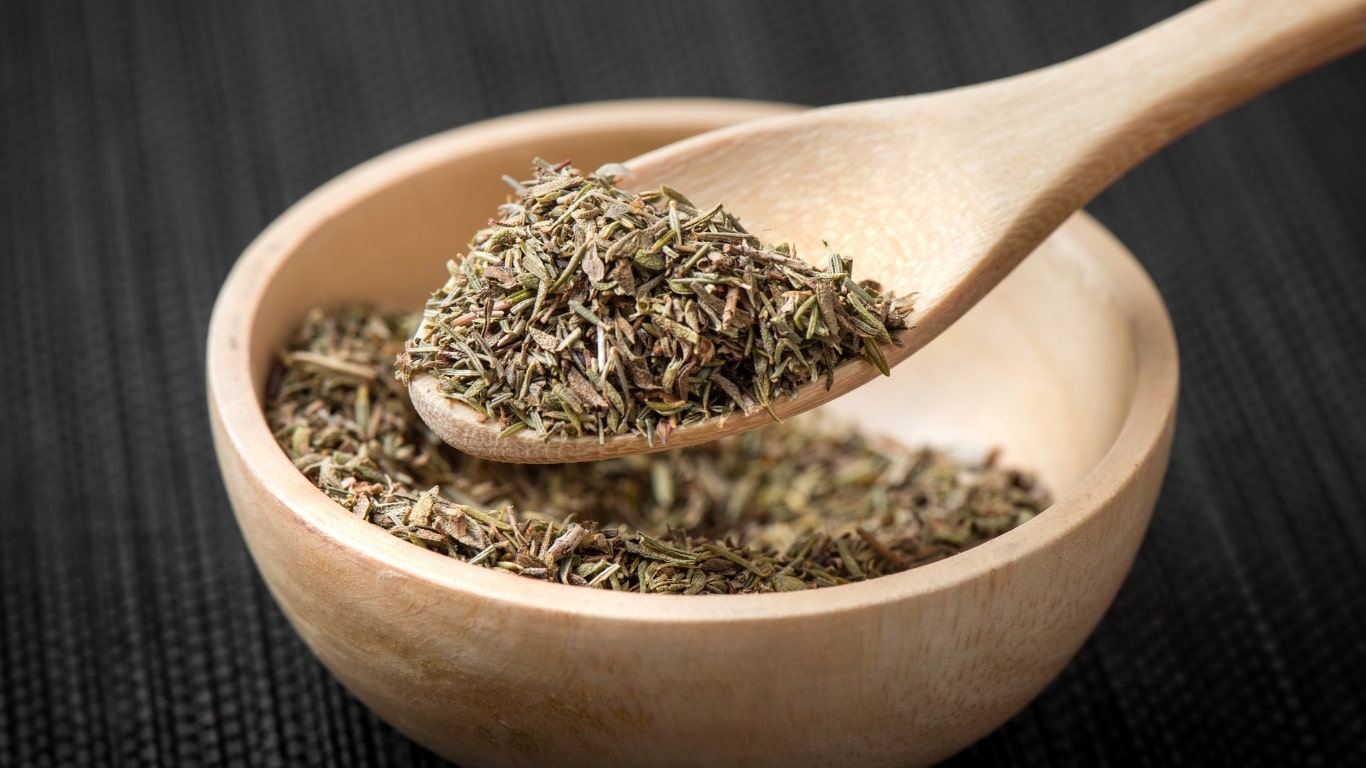
Introduction
Thyme (Thymus vulgaris) is a small perennial herb belonging to the mint family (Lamiaceae), renowned for its aromatic leaves and myriad of uses. Native to the Mediterranean region, thyme has been cherished for thousands of years for its culinary, medicinal, and ornamental value. Today, thyme remains a staple in kitchens worldwide and is celebrated in traditional and modern medicine alike. In this article, we’ll explore the history, varieties, cultivation, culinary uses, medicinal benefits, and more, providing a comprehensive understanding of this timeless herb.
History and Origin of Thyme
The use of thyme dates back to ancient civilizations. The Sumerians, around 3,000 BC, utilized thyme as an antiseptic. Ancient Egyptians used thyme for embalming purposes, due to its preservative and antibacterial properties. The Greeks were fond of thyme as well, using it in baths and burning it as incense in temples, believing it was a source of courage and strength.
The name “thyme” is derived from the Greek word “thymos,” meaning “courage,” reflecting its association with bravery. In medieval times, knights would wear scarves embroidered with thyme leaves as a symbol of bravery. Additionally, thyme was commonly placed beneath pillows to ward off nightmares and promote restful sleep.
Varieties of Thyme
Thyme comes in several varieties, each with its unique characteristics. The most common types include:
- Common Thyme (Thymus vulgaris): This is the most widely used variety in cooking. It has small, green leaves with a strong, earthy aroma and flavor. Common thyme is often referred to as garden thyme.
- Lemon Thyme (Thymus × citriodorus): As the name suggests, lemon thyme has a citrusy aroma and flavor, making it perfect for dishes that require a hint of lemon. It’s a hybrid between common thyme and a wild thyme species.
- Creeping Thyme (Thymus serpyllum): This variety is often used as ground cover in gardens. While it’s not as commonly used in cooking, it is still edible and has a milder flavor than common thyme.
- Caraway Thyme (Thymus herba-barona): Known for its caraway-like scent, this variety is often used in baking and to flavor meats, especially in Mediterranean dishes.
- Woolly Thyme (Thymus pseudolanuginosus): This type of thyme is more ornamental, known for its soft, woolly texture. It’s not typically used in cooking but is popular in rock gardens and as ground cover.
Thyme Plant Cultivation and Harvesting

Thyme is a hardy plant that thrives in well-drained soil with full sun exposure. It’s relatively drought-tolerant and can be grown both indoors and outdoors, making it a versatile addition to any garden or windowsill.
- Soil and Planting: Thyme prefers sandy or loamy soil with a pH between 6.0 and 8.0. When planting, it’s essential to ensure the soil is well-drained, as thyme doesn’t tolerate waterlogged conditions. Plant thyme in spring after the last frost or in fall in milder climates.
- Watering: Once established, thyme requires minimal watering. Overwatering can lead to root rot, so it’s crucial to let the soil dry out between watering.
- Pruning: Regular pruning encourages bushy growth and prevents the plant from becoming too woody. Trim thyme back in early spring and after flowering to maintain its shape and promote new growth.
- Harvesting: Thyme can be harvested throughout the growing season. For the best flavor, harvest thyme in the morning after the dew has dried but before the heat of the day sets in. Cut the top five to six inches of the stem, and be sure to leave a few inches so the plant can continue to grow.
- Preserving Thyme: Thyme can be used fresh, but it also dries well. To dry thyme, hang small bunches in a cool, dark, well-ventilated area. Once dried, strip the leaves from the stems and store them in an airtight container away from light and heat.
Culinary Uses of Thyme Herb

Thyme is a cornerstone of Mediterranean cuisine and is widely used in French, Italian, and Middle Eastern cooking. Its earthy, slightly minty flavor complements a wide variety of dishes, from soups and stews to roasted meats and vegetables.
Flavoring Meats
Thyme is a quintessential herb for enhancing the flavor of meats, especially lamb, chicken, and pork. Its earthy, slightly minty aroma complements the natural richness of these proteins, infusing them with a depth of flavor that elevates even the simplest of dishes. Thyme’s robust character makes it a perfect match for other aromatic herbs like rosemary, sage, and oregano, which together create a harmonious and complex seasoning blend. For instance, thyme is often used in marinades or rubs, where it penetrates the meat, imparting its distinctive flavor during cooking. Whether you’re roasting a whole chicken, grilling pork chops, or slow-cooking a leg of lamb, thyme ensures the meat remains aromatic and flavorful, while also helping to tenderize and preserve its natural juices.
Soups and Stews
Thyme is a staple in many soups and stews, where its flavor shines in slow-cooked, hearty dishes. Its resilience to prolonged cooking makes it an ideal herb to include in a bouquet garni—a traditional French bundle of herbs tied together and simmered in broths and stocks. As thyme infuses into the liquid, it imparts a subtle, savory taste that enhances the overall complexity of the dish. Whether you’re preparing a classic chicken noodle soup, a rich beef stew, or a vegetable broth, thyme helps build a layered, comforting flavor. Its ability to marry well with other herbs and spices allows it to add depth without overwhelming the other ingredients, making it an essential component in creating flavorful, aromatic soups and stews.
Vegetables and Salads
Thyme adds a burst of flavor to roasted, sautéed, or even raw vegetables, transforming simple sides into gourmet dishes. When sprinkled over vegetables like carrots, potatoes, or Brussels sprouts before roasting, thyme imparts a warm, earthy aroma that pairs beautifully with the caramelized flavors that develop during cooking. For sautéed greens, a few sprigs of fresh thyme can elevate the dish, adding a subtle complexity that balances the bitterness of vegetables like spinach or kale. Thyme also works wonderfully in salads, especially when incorporated into vinaigrettes or dressings. The herbaceous note of thyme complements the freshness of leafy greens, tomatoes, and cucumbers, adding a hint of aromatic warmth that enhances the salad’s overall taste.
Bread and Baking
Thyme’s versatility extends to the world of baking, where it is used to infuse savory breads, crackers, and pastries with its distinctive flavor. It pairs particularly well with cheese, making it a popular addition to cheese breads, scones, and biscuits. Thyme can be kneaded directly into the dough or sprinkled on top before baking to create an aromatic crust. Its earthy, slightly peppery taste provides a delightful contrast to the richness of butter and cheese, resulting in baked goods that are both flavorful and fragrant. In addition to breads, thyme can also be used in savory tarts or quiches, where it complements ingredients like tomatoes, onions, and mushrooms, adding a sophisticated touch to the finished product.
Herbal Teas
Thyme tea is a simple yet powerful beverage made by steeping fresh or dried thyme leaves in hot water. This herbal infusion is not only refreshing but also packed with health benefits. The warm, aromatic tea can aid digestion by stimulating the production of digestive enzymes and relieving symptoms like bloating and indigestion. Thyme tea is also known for its ability to soothe respiratory issues, such as coughs and bronchitis, thanks to its antibacterial and anti-inflammatory properties. Sipping thyme tea regularly can help boost your immune system, calm an upset stomach, and provide relief from cold symptoms. The tea’s pleasant, mildly minty flavor makes it a comforting drink that can be enjoyed at any time of the day, whether as a morning ritual or a calming evening beverage.
Thyme Herb Medicinal Benefits
Thyme has been used medicinally for centuries. Its health benefits are attributed to its high content of vitamins, minerals, and volatile oils, particularly thymol, which has antiseptic, antibacterial, and antifungal properties.
Respiratory Health
Thyme has long been valued as a potent natural remedy for respiratory ailments, thanks to its antispasmodic, expectorant, and antimicrobial properties. It is particularly effective in alleviating symptoms associated with coughs, bronchitis, and asthma. The active compounds in thyme, such as thymol and carvacrol, help to relax the muscles in the respiratory tract, making it easier to breathe.
Thyme also acts as an expectorant, promoting the clearing of mucus from the airways, which is especially beneficial in treating productive coughs. One common method of using thyme for respiratory health is through thyme tea, which provides soothing relief to the throat while also delivering its medicinal properties directly to the respiratory system. Additionally, inhaling steam infused with thyme essential oil can help decongest blocked nasal passages, reduce inflammation, and provide relief from sinusitis and other respiratory issues.
Digestive Aid
Thyme is a well-known digestive aid, celebrated for its ability to enhance digestive function and relieve various forms of gastrointestinal discomfort. The herb stimulates the production of digestive enzymes, which aids in the efficient breakdown of food and the absorption of nutrients. Its carminative properties make thyme particularly effective in reducing bloating, gas, and indigestion by helping to expel gas from the intestines and preventing the formation of new gas bubbles.
Additionally, thyme’s antispasmodic effects can relieve spasms and cramps in the stomach and intestines, making it a useful remedy for conditions like irritable bowel syndrome (IBS). Incorporating thyme into your diet, whether through seasoning food or drinking thyme tea, can support a healthy digestive system and alleviate common digestive complaints.
Antimicrobial Properties
Thyme’s antimicrobial properties are primarily due to its high content of thymol, a potent compound with proven antibacterial, antifungal, and antiviral effects. Thymol disrupts the cell membranes of harmful microorganisms, inhibiting their growth and reducing the risk of infection. This makes thyme an effective natural disinfectant for both internal and external use. For instance, thyme can be used to treat minor cuts and wounds to prevent infection.
Additionally, thyme extracts are often found in natural mouthwashes and toothpaste, where they help combat oral bacteria and reduce the risk of dental infections and gum disease. Thyme’s antimicrobial properties extend to its use in preserving foods and protecting them from spoilage caused by bacteria and fungi. As a result, thyme is not only a valuable culinary herb but also a natural tool in maintaining hygiene and preventing illness.
Skin Care
Thyme is a beneficial herb in skincare, particularly in treating acne and other inflammatory skin conditions. Its strong antibacterial properties, driven by thymol, help reduce the presence of Propionibacterium acnes, the bacteria responsible for causing acne. Regular application of thyme-infused products can help clear up existing breakouts and prevent new ones from forming. Additionally, thyme’s anti-inflammatory properties soothe irritated skin, reducing redness, swelling, and the discomfort associated with acne.
Thyme is also used in natural remedies for eczema and dermatitis, where it helps to calm inflamed skin and promote healing. Beyond its antibacterial and anti-inflammatory effects, thyme is rich in antioxidants, which protect the skin from oxidative stress and premature aging caused by environmental factors like pollution and UV rays. Incorporating thyme into your skincare routine, whether through homemade remedies or commercial products, can lead to clearer, healthier skin.
Immune Support
Thyme is a powerful immune booster, packed with antioxidants and essential vitamins, including vitamin C and vitamin A. These nutrients play a crucial role in maintaining a strong immune system by neutralizing free radicals, reducing oxidative stress, and enhancing the body’s natural defense mechanisms. Regular consumption of thyme can help protect the body from infections, colds, and other common illnesses by strengthening the immune response. Thymol, the same compound that provides thyme’s antimicrobial properties, also supports immune health by fighting off harmful pathogens.
In addition to its direct immune-boosting effects, thyme can aid in overall health by supporting other bodily functions, such as digestion and respiratory health, which are closely linked to immune function. Whether used in cooking, taken as a supplement, or enjoyed as a tea, thyme can be an integral part of a healthy diet aimed at maintaining robust immune health.
Other Uses of Thyme
Beyond its culinary and medicinal uses, thyme has several other applications:
- Essential Oil: Thyme essential oil is used in aromatherapy for its invigorating and uplifting properties. It can also be applied topically, diluted with a carrier oil, to treat skin conditions or relieve muscle pain.
- Insect Repellent: The strong scent of thyme is effective in repelling insects, particularly mosquitoes. Thyme oil can be used in natural insect repellents, or thyme plants can be grown in gardens to deter pests.
- Ornamental Plant: Thyme is a beautiful addition to gardens, especially rock gardens, borders, and ground cover. Its small, aromatic leaves and delicate flowers add texture and fragrance to outdoor spaces.
- Symbolism and Folklore: Thyme has been associated with various symbolic meanings throughout history, including courage, purification, and protection. It was often used in rituals and ceremonies to ward off evil spirits and promote well-being.
Frequently Asked Questions
What is the herb thyme good for?
Thyme is a versatile herb valued for its culinary and medicinal properties. It is rich in vitamins, minerals, and antioxidants, particularly thymol, which provides antibacterial, antifungal, and anti-inflammatory benefits. Thyme is commonly used to enhance the flavor of various dishes, and it also supports respiratory health, aids digestion, boosts the immune system, and promotes skin health.
What disease is thyme used for?
Thyme is used for several health conditions, particularly respiratory issues such as coughs, bronchitis, and asthma. It is also effective in treating gastrointestinal problems like indigestion, bloating, and gas. Additionally, thyme’s antimicrobial properties make it useful in treating infections and skin conditions such as acne.
Can I drink thyme tea every day?
Yes, you can drink thyme tea every day, and doing so can offer several health benefits. Regular consumption of thyme tea may help improve digestion, boost the immune system, and soothe respiratory issues. However, it is essential to consume it in moderation, as excessive intake could lead to potential side effects or interactions with medications.
Who should not take thyme?
People who are allergic to plants in the mint family (Lamiaceae), including thyme, should avoid consuming it. Pregnant and breastfeeding women should also use thyme cautiously, as high doses could stimulate the uterus. Additionally, individuals with certain medical conditions, such as hormone-sensitive cancers or those on blood-thinning medications, should consult a healthcare professional before using thyme.
Is thyme tea good for kidneys?
Thyme tea can be beneficial for the kidneys due to its diuretic properties, which help flush out toxins and excess fluids from the body. However, individuals with kidney disease should consult a healthcare provider before regularly consuming thyme tea, as the herb may interact with certain medications or exacerbate specific conditions.
Is thyme good for the liver?
Thyme is considered beneficial for the liver due to its antioxidant properties, which help protect the liver from oxidative stress and support detoxification processes. However, those with liver conditions or on medications that affect liver function should consult a healthcare professional before using thyme as a regular remedy.
Conclusion
Thyme is more than just a common herb; it’s a versatile plant with a rich history, a wide range of varieties, and countless applications. From its culinary uses in enhancing the flavor of dishes to its medicinal benefits in promoting health and wellness, thyme is a true powerhouse in the plant kingdom. Whether you’re a gardener, a cook, or someone interested in natural remedies, thyme is a valuable herb that deserves a place in your garden, kitchen, and life. With its timeless appeal and endless benefits, thyme continues to be cherished around the world, proving that sometimes the best things really do come in small packages. Buy some thyme herbs to add to your dishes today!
